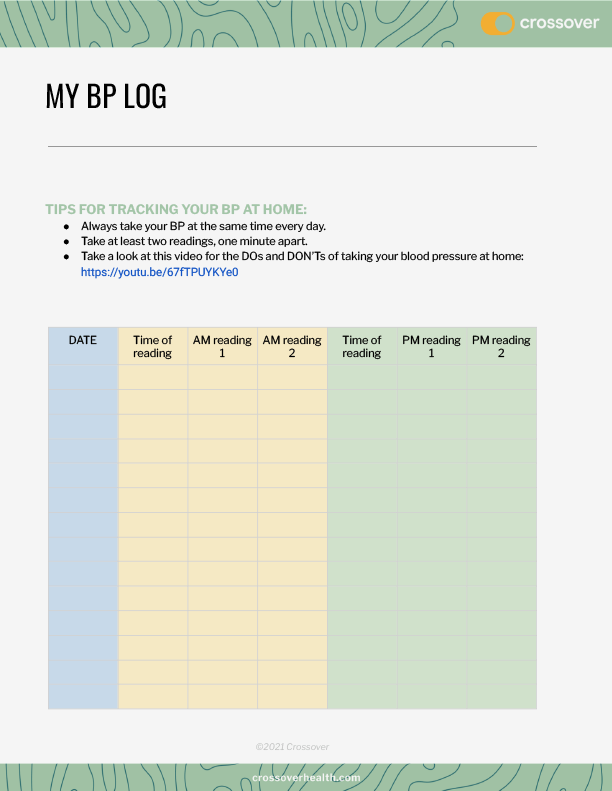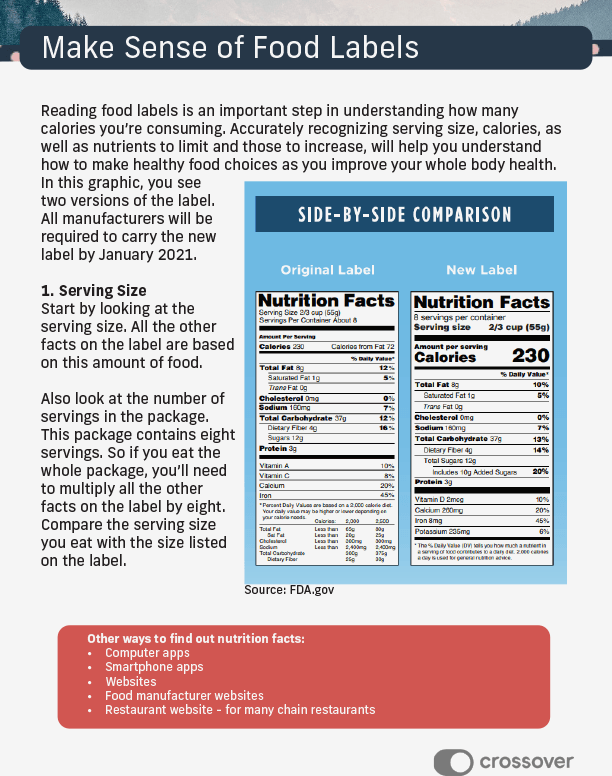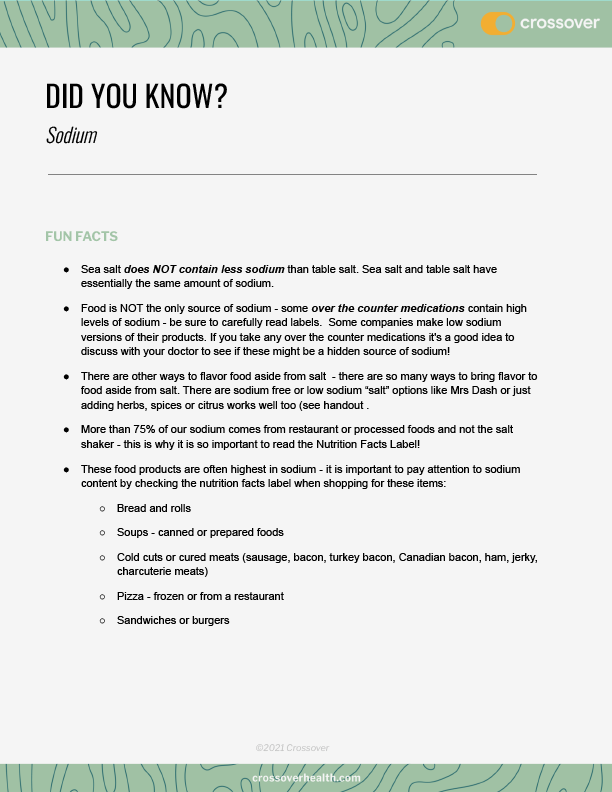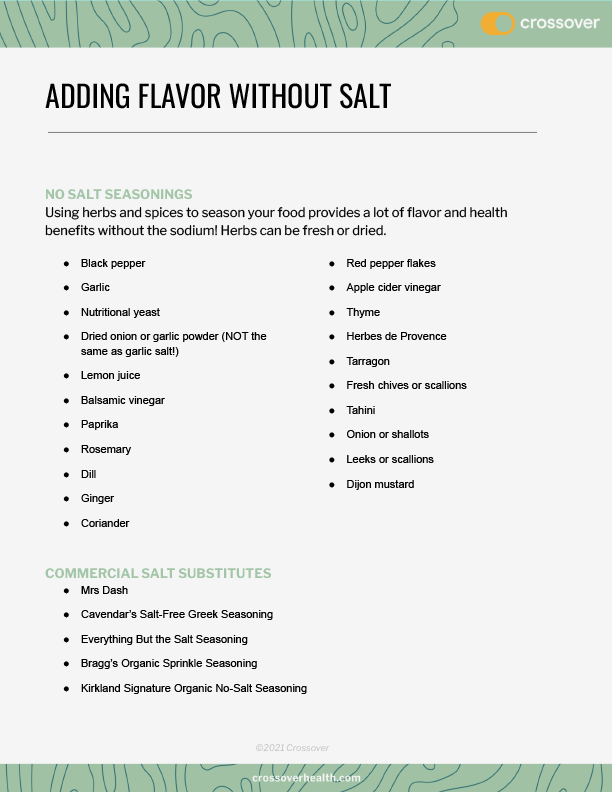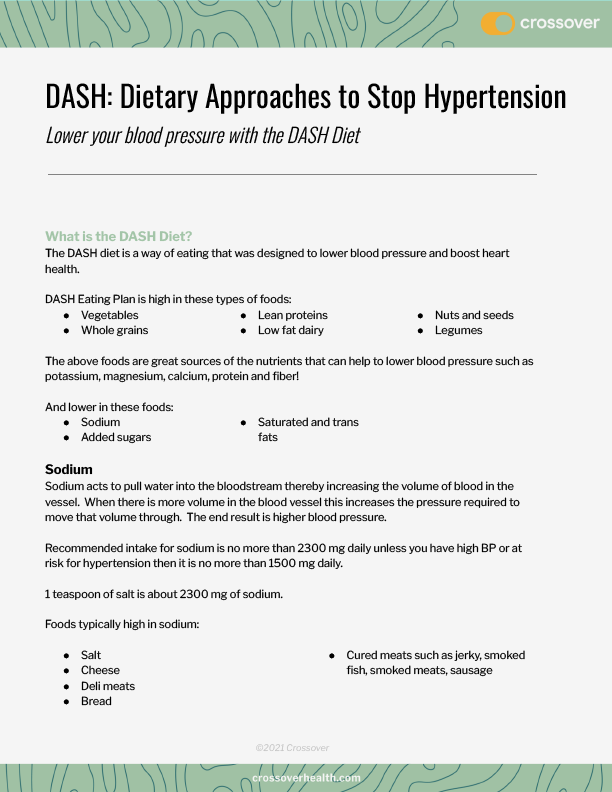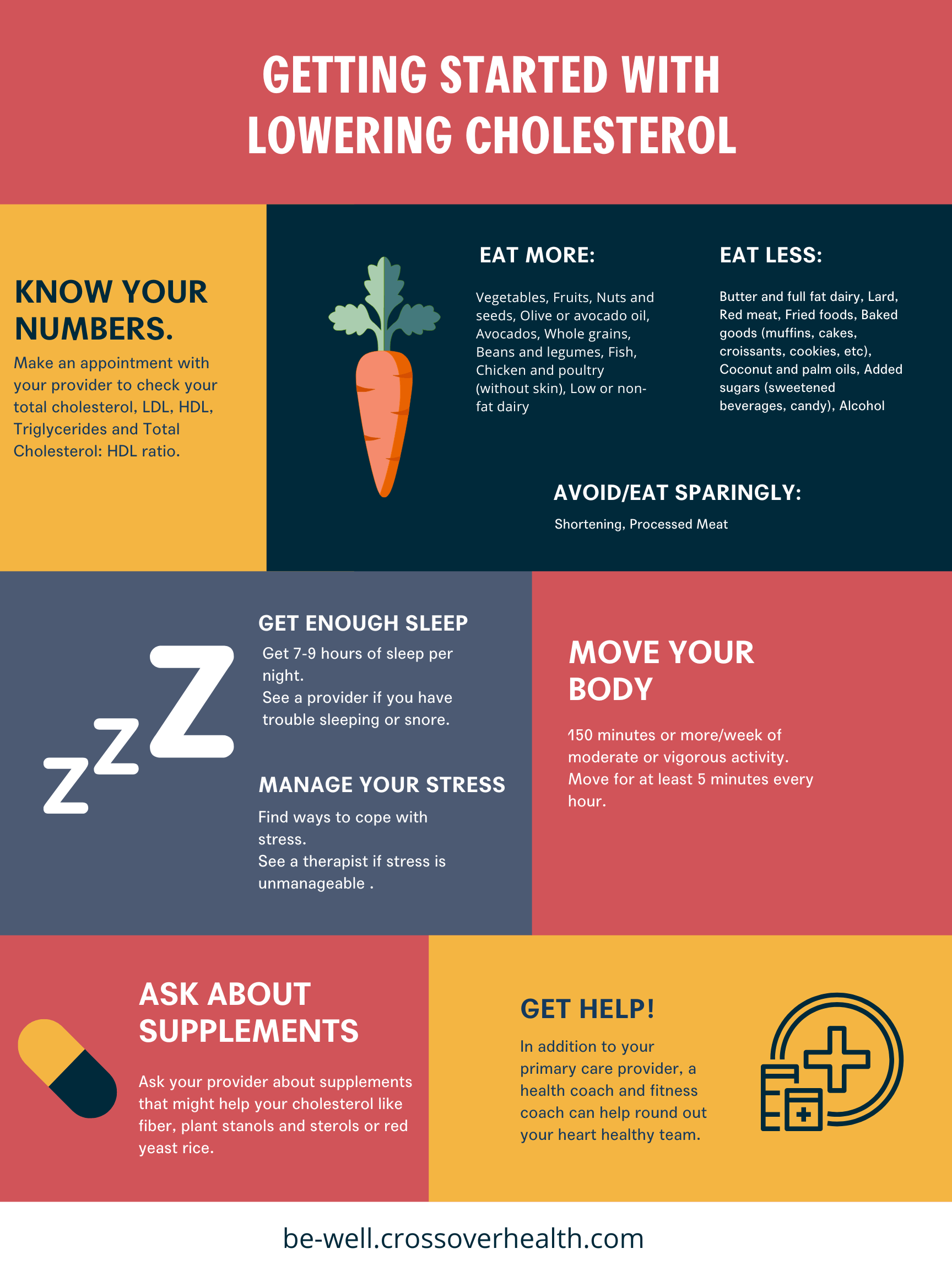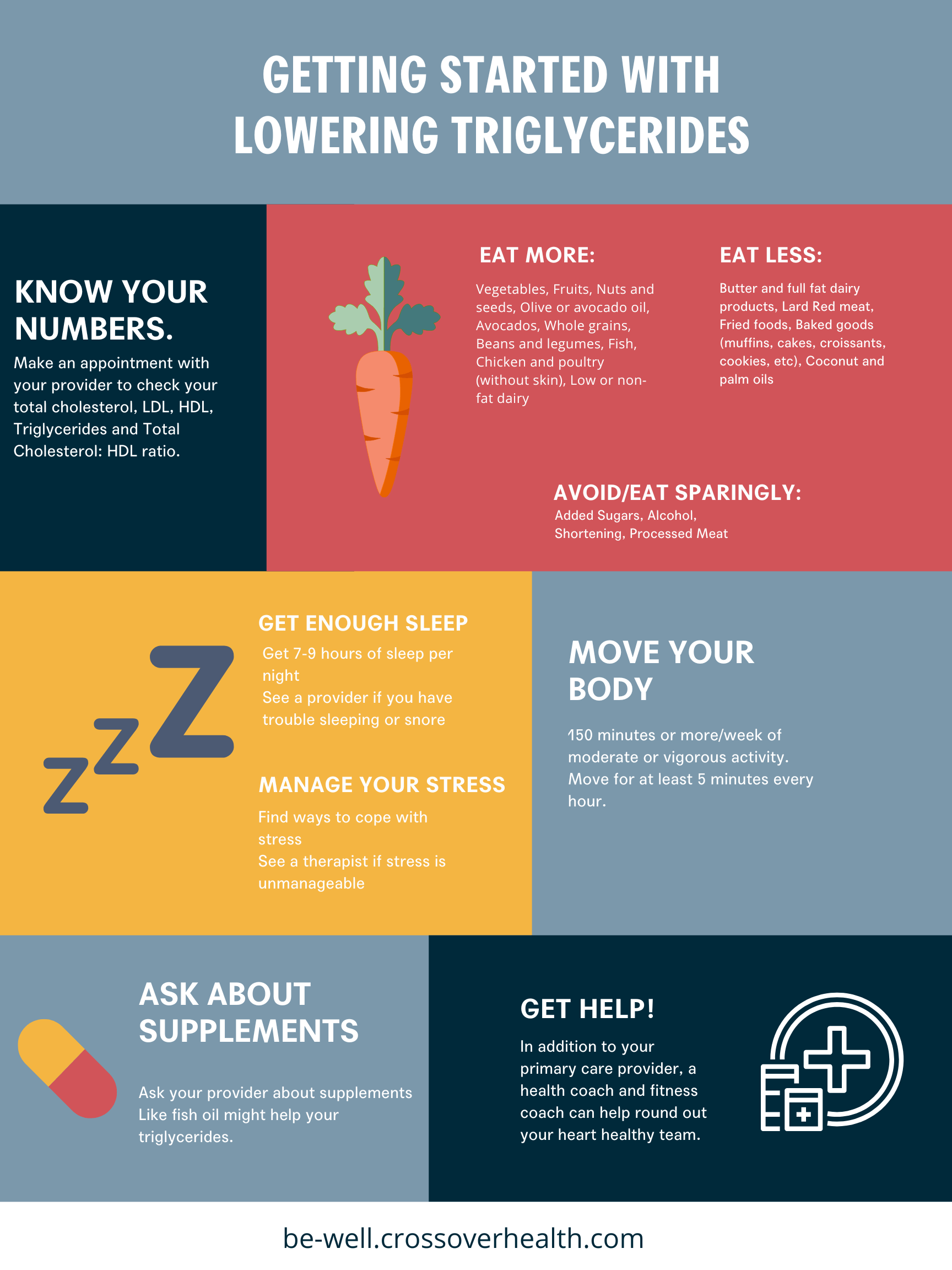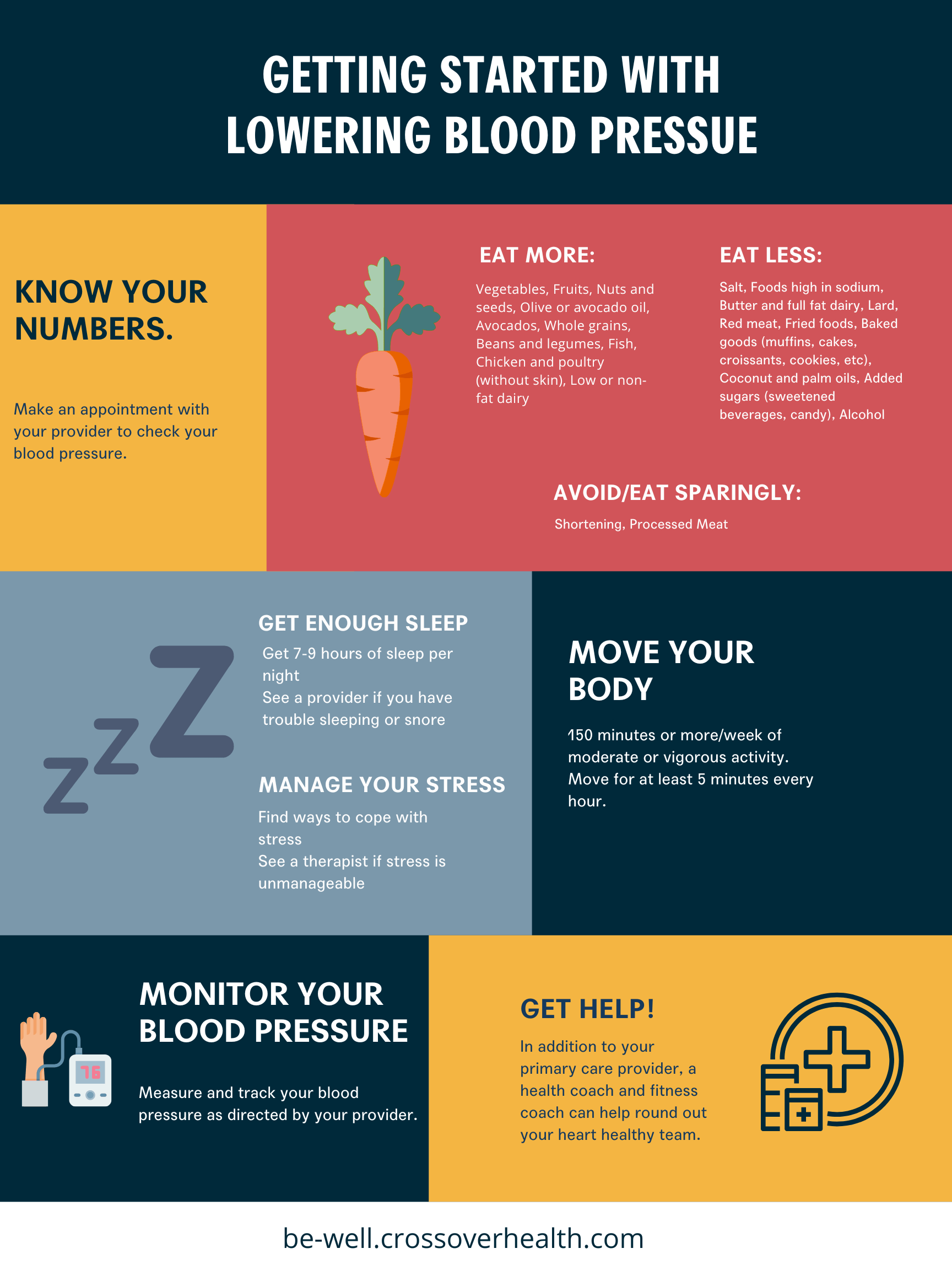
Heart Smart
Your heart is the hardest working muscle in your body. For this reason, it’s important to be smart about your heart. Learn what the numbers in your heart-related tests mean. Explore heart-healthy eating plans. Discover how various lifestyle factors, such as sleep and stress, can impact your heart health. Get practical strategies for lowering your cholesterol, triglycerides, and blood pressure. Whatever your goals for heart health, we’re here to help.
Learn. Find the tips that fit your situation.
Practice. Choose from helpful strategies.
Let us help. Connect with your Crossover care team
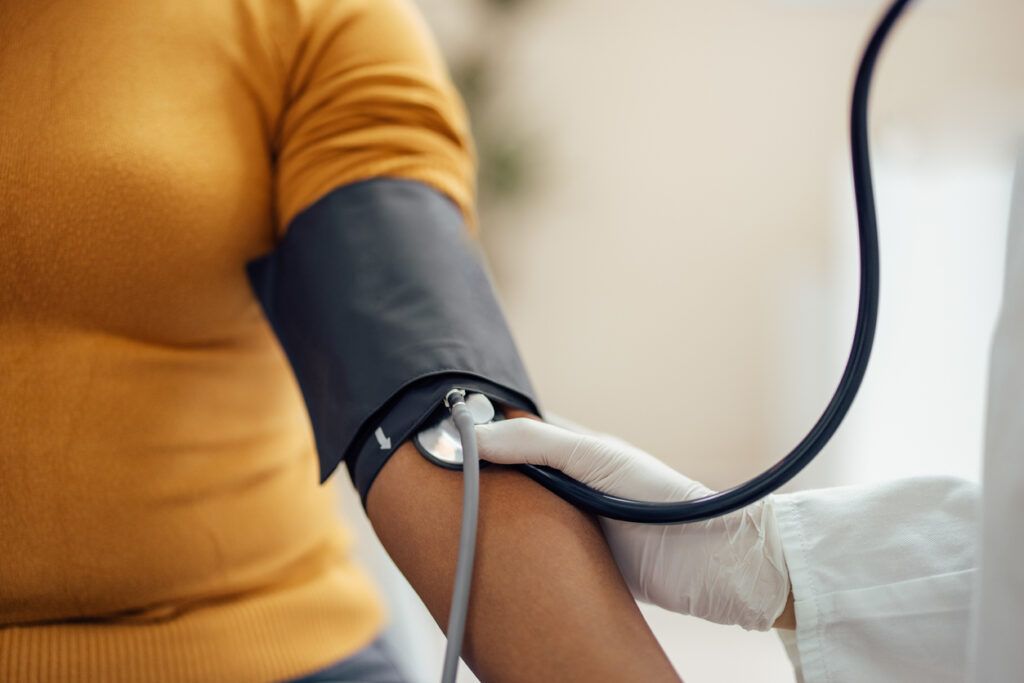
YOU’LL LEARN ABOUT:
- Heart Health Tests and Results
- What Factors Affect Your Heart Health
- Nutrition for Heart Health
- Heart-Friendly Eating Plans
- Physical Activity and Heart Health
- Sleep, Stress, and Heart Health
- Tobacco and Heart Health
- Lowering Cholesterol—Where to Start
- Lowering Triglycerides—Where to Start
- Lowering Blood Pressure—Where to Start
- How Crossover Can Help
EXPERT GUIDANCE PROVIDED BY:
-
Camilla Lee, NBC-HWCVirtual Health CoachCamilla is a registered dietitian nutritionist and a board-certified health and wellness coach. As a health coach at Crossover, she loves to help people set themselves up for success. This involves creating routines that make healthy choices feel easy and building consistent habits to bring balance and support self-care.
-
Danielle Heuseveldt, RD, NBC-HWCRegistered DietitianDanielle is the Health Coach Program Director at Crossover. She is both a registered dietitian and certified health and wellness coach. In addition to a wealth of knowledge, she brings passion, compassion, practicality, and a touch of fun to the coaching partnership with members, and works to encourage and empower them to live their best lives.
The first step in taking control of your heart health is finding out how healthy your heart is right now. The best way to do this is through testing. But health-related tests can be confusing—this section can help you understand them. First, let’s cover what cholesterol, triglycerides, and blood pressure are and how they relate to heart health. Then we’ll cover the tests that measure each of them, and what the numbers mean in your test results.
Cholesterol
Cholesterol is a waxy substance that your body makes naturally. It’s used for a variety of processes, such as making new cells, vitamins, and hormones. Your liver makes cholesterol, and you also get cholesterol from any animal foods you consume, such as dairy, eggs, seafood, fish, or meat. While your body needs some cholesterol, too much can cause buildups in your blood vessels. Your blood vessels are like pipes, and if they get clogged up with too much cholesterol, called plaque, it makes it very hard for your blood to move through them.
LDL and HDL
While the amount of cholesterol in your blood vessels is important, what type of cholesterol it is also matters. Low-density lipoprotein (LDL) is referred to as “bad cholesterol.” It carries cholesterol through the bloodstream. LDL has a bad reputation because it is more likely to contribute to cholesterol buildup in the arteries.
High-density lipoprotein (HDL) is referred to as “good cholesterol.” HDL absorbs cholesterol in the bloodstream and then carries it to the liver, where it is flushed out of the body. For this reason, high levels of HDL can protect you from heart disease and stroke.
Think about LDL and HDL as an “odd couple” in your body. LDL is the messy roommate, leaving their cholesterol lying around to build up in the walls of your blood vessels as plaque. HDL is the clean roommate, constantly tidying up your bloodstream and returning cholesterol to your liver, so that your body can get rid of it.
Triglycerides
Triglycerides are a type of fat in your blood that your body uses for energy. Too many triglycerides in your blood can act like LDL cholesterol and build up in your blood vessels. This can lead to heart attacks and strokes.
Blood Pressure
Another important heart health number is your blood pressure. Just like it sounds, blood pressure is the amount of pressure your blood puts on your blood vessels as your heart beats and rests between beats. Blood pressure readings have two numbers that are written like a fraction. When you read or say your blood pressure out loud, you say the top number “over” the bottom number. For example, “My blood pressure is 120 over 80.”
The top number is your systolic blood pressure. It measures the pressure in your arteries when your heart beats, or contracts.
The bottom number is your diastolic blood pressure. It measures the pressure in your arteries when your heart rests between beats.
The Tests and Your Results
One of the common blood tests related to heart health is called a lipid panel. Lipid is just a fancy name for fat. A lipid panel measures your total cholesterol, LDL, HDL, and triglyceride levels. It might also look at how much of your total cholesterol is HDL, which is shown as a ratio.
When looking at your test results, remember that < means “less than,” > means “greater than,” and ratios are written using a colon (:). For example, the ratio 3:1 is read as “three to one.”
Total Cholesterol
This is a measure of all the types of cholesterol in your blood. Total cholesterol < 200mg/dl is desirable.
LDL
<100mg/dl is optimal.
100–129mg/dl is near optimal.
130–159mg/dl is borderline high.
160–189mg/dl is high.
190mg/dl is very high.
HDL
For men: HDL > 40 mg/dl is desirable.
For women: HDL > 50 mg/dl is desirable.
Total Cholesterol HDL Ratio
This measures how much of the total cholesterol in your body is made up of HDL cholesterol. Because HDL is the “good kind” of cholesterol, you want this ratio to be high.
A ratio < 5:1 is ideal.
A ratio < 3.5:1 is considered very good.
Triglycerides
< 150 mg/dl is desirable (fasting).
Blood Pressure
<120/80 is normal.
120–139/80–89: Prehypertension
140–159/90–99: Hypertension Stage 1
>160/100: Hypertension Stage 2
A Note on Self-Monitoring Blood Pressure
 Self-monitored blood pressure (SMBP) is when you measure your blood pressure at home or anywhere outside of the doctor’s office or other health care setting. Monitoring your blood pressure at home, in a familiar setting, allows you to measure at different times throughout the day and over a longer period of time. This can help your doctor have a more accurate understanding of your blood pressure and develop a treatment plan to better control it. This can prevent more serious health problems from developing.
Self-monitored blood pressure (SMBP) is when you measure your blood pressure at home or anywhere outside of the doctor’s office or other health care setting. Monitoring your blood pressure at home, in a familiar setting, allows you to measure at different times throughout the day and over a longer period of time. This can help your doctor have a more accurate understanding of your blood pressure and develop a treatment plan to better control it. This can prevent more serious health problems from developing.
According to the American Heart Association and the American Medical Association, there is strong evidence that using SMBP can help lower blood pressure and improve your blood pressure control. Also, people who engage in SMBP may be more likely to take action and maintain behaviors to improve their health in other ways.
If your provider has recommended that you do SMBP, take a look at the video, handout, and blood pressure log below:
There are many factors that might be affecting your heart health:
- Poor diet
- Waist circumference > 35 in. for women, > 40 in. for men
- Smoking or regular exposure to secondhand smoke
- Advanced age
- Diabetes
- Low activity levels
- Chronic stress
- High blood pressure
- Elevated cholesterol (LDL and total cholesterol/HDL ratio)
- Elevated triglyceride levels
- Family history
- Chronic kidney disease
- Obstructive sleep apnea
The good news is that most of the factors in this list are in your control, such as diet, smoking, and physical activity. Each of the sections below will cover practical strategies and lifestyle changes you can use to improve your heart health. Try out some of the suggestions in the sections that apply to you and stick with the ones that work.
You already know that what you eat matters to your health. But knowing how and why the food you eat affects your body—and your heart—can make a big difference in your motivation to eat well. According to the American Heart Association, many different ways of eating can be heart friendly. Just make sure your diet has:
- A variety of fruits and vegetables
- A variety of whole grains
- Healthy protein sources, such as plant-based proteins (beans, lentils, nuts, seeds), fish, lean meats and poultry, or nonfat and low-fat dairy
- Non-tropical (coconut or palm) plant-based oils
- Limited added sugar
- Limited sodium
- Limited alcohol
Why is this list recommended? Because following these guidelines means your diet will have more helpful nutrients (like fiber and plant fats) and less harmful nutrients (like sodium). We’ll cover the specifics of different nutrients below but first, let’s talk about reading labels on food.
Reading Labels
Good nutrition starts with knowing what you’re eating. This means reading labels. The handout below shows you how to understand food labels and how to use them to guide healthy eating.
Fiber
Fiber is found in plants like fruits, vegetables, and whole grains. There are two types of fiber—soluble and insoluble. While both are important, soluble fiber really shines when it comes to heart health. Soluble fiber dissolves in water and forms a gel. As that gel moves through your small intestine, it collects LDL cholesterol and prevents it from entering your bloodstream. Instead, it moves it out of the body in your bowel movements. How can you get more soluble fiber in your diet? In addition to eating more fruits, vegetables, and whole grains overall, try these foods to your regular diet:
- Oatmeal
- Beans
- Avocado
- Apples or pears
Fats
There are three main types of fats. Let’s go through each and talk about how it affects your cholesterol and heart health.
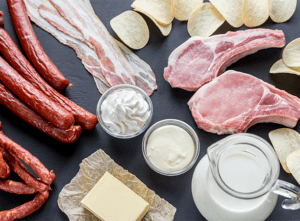 Saturated fats: These fats are mostly found in animal sources (as well as palm and coconut oil). They are solid at room temperature. Saturated fats cause your liver to produce more bad cholesterol (LDL). They also affect cells in your blood vessels that tell your body to return bad cholesterol to the liver, which means more buildups, causing plaque. The American Heart Association recommends limiting saturated fat to <6% of your overall calorie intake ( about 11–13 g for a 2000 calorie diet).
Saturated fats: These fats are mostly found in animal sources (as well as palm and coconut oil). They are solid at room temperature. Saturated fats cause your liver to produce more bad cholesterol (LDL). They also affect cells in your blood vessels that tell your body to return bad cholesterol to the liver, which means more buildups, causing plaque. The American Heart Association recommends limiting saturated fat to <6% of your overall calorie intake ( about 11–13 g for a 2000 calorie diet).
Trans fats: While there are some trans fats that occur naturally in dairy and meat, most are created in a process called hydrogenation. Just like saturated fats, trans fats cause your liver to create more bad cholesterol. They also cause your liver to produce less good cholesterol. The good news is that federal law has banned trans fats from grocery stores and restaurants in the U.S.
Unsaturated fats: These fats come from plant sources. They are liquid at room temperature. There are two types: poly-unsaturated and monounsaturated fats. Eating more of these types of fats helps your liver produce more good cholesterol and less bad cholesterol.
Remember:
- The total amount of fat you eat every day should only be a third of your total calories.
- Replacing saturated and trans fats with unsaturated fats is helpful to your blood cholesterol and reduces heart disease risk.
Dietary Cholesterol
What about cholesterol found in foods like shellfish and eggs? Research shows little to no link between dietary cholesterol and heart health. If you are eating a diet that is low in saturated fat, it will also likely be low in cholesterol. If you have healthy cholesterol levels, you can safely eat up to one whole egg per day, and include shellfish in a balanced eating plan. If you already have high cholesterol, limit egg consumption to one whole egg a few times per week.
Sodium
Sodium pulls water into the bloodstream. This increases the volume of blood in your blood vessels. When there is more volume in the blood vessel, this increases the pressure required to move that volume through. The end result is higher blood pressure.
Recommended intake for sodium is no more than 2300 mg daily. If you have or are at risk for high blood pressure, recommended daily intake is reduced to 1500 mg daily. The best way to reduce your sodium intake is to cut out added salt. Did you know that only one teaspoon of salt has 2300 mg of sodium? Also, cutting back on foods high in sodium, like cheese, deli meat, cured meats, and breads, can also help.
Take a look at these handouts for more information:
Potassium
Potassium reduces the effect of sodium in the body. The more potassium you eat, the more sodium in your body will be released through your urine. Potassium also acts to reduce the tension on the walls of your blood vessels, which lowers blood pressure.
Recommended intake for potassium is 4700 mg daily. If you have kidney problems, be sure to discuss potassium intake with your doctor. The best way to get potassium is through whole foods.
Foods high in potassium:
|
|
Carbohydrates and Sugar
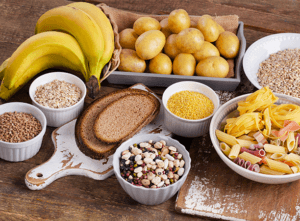 Carbohydrates are one of the three macronutrients that make up our total daily calorie intake. Carbohydrate foods break down into sugar, which is then used by the cells in your body for energy. Carbohydrates occur naturally in many foods, including fruits, vegetables, grains, legumes, and dairy. These whole foods provide many nutrients to the body, including fiber, protein, and essential vitamins and minerals. Consumption of these nutrient-dense foods has been shown to reduce the risk of chronic disease such as diabetes, some cancers, and heart disease.
Carbohydrates are one of the three macronutrients that make up our total daily calorie intake. Carbohydrate foods break down into sugar, which is then used by the cells in your body for energy. Carbohydrates occur naturally in many foods, including fruits, vegetables, grains, legumes, and dairy. These whole foods provide many nutrients to the body, including fiber, protein, and essential vitamins and minerals. Consumption of these nutrient-dense foods has been shown to reduce the risk of chronic disease such as diabetes, some cancers, and heart disease.
Not all sources of sugar are created equal. While many foods contain sugar naturally, processed foods can have a lot of added sugars. Sugars are added to foods to make them taste better or last longer on the shelf. Foods with a lot of added sugars include sweetened beverages, flavored yogurts, cereals, baked goods, and candy. Hidden added sugars are found in condiments, bread, and cured meats. Added sugar provides little to no nutritional value.
Sugar fuels every organ in the body but there is a limit to how much the body can use. Your organs take up sugar from the blood to be used for energy. Once the body has what it needs, sugar is stored in the body as fat, specifically triglycerides. The accumulation of body fat can lead to obesity, which increases the risk for diabetes and heart disease.
Excess sugar consumption can also raise bad cholesterol (LDL cholesterol), increase blood pressure, and cause inflammation in the body. LDL cholesterol can accumulate in the arteries as plaque buildup, restricting blood flow to the heart and brain. High blood pressure can also harden your arteries, increasing your risk for heart attack and stroke. Some studies have shown an association between added sugar intake, specifically from sugar-sweetened beverages, and an inflammatory marker called C-Reactive Protein. Weight gain and obesity from excess calorie intake can also lead to low-grade chronic inflammation.
How much sugar is safe to eat? While carbohydrate foods are essential to the diet, you should choose whole food sources of carbohydrates and limit added sugars. It is also important to eat carbohydrates in combination with a good amount of protein, healthy fats, and non-starchy vegetables. This can help you get a variety of nutrients and keep your energy levels stable throughout the day.
Carbohydrates should make up about 45–60 % of your daily calories, with added sugar < 6–10 % of those calories. An easy rule to remember is that men should consume no more than six teaspoons of added sugar per day, and women should consume no more than four teaspoons of added sugar per day.
Sugar Overload: Most Americans consume between 15–20 teaspoons of added sugar per day. This is more than double the recommended amount! Want to know how much sugar you’re eating? Check out this sugar overload calculator.
Alcohol
Excessive alcohol consumption can indirectly affect heart health. Alcohol provides little to no nutritional benefit. It also has a lot of calories. This can lead to weight gain and obesity. Overconsumption of alcohol can also increase levels of fat in the blood, including triglycerides or bad cholesterol (LDL). Drinking a lot of alcohol can also increase blood pressure.
Alcohol can also affect the heart directly. When you drink, there is a short-term increase in heart rate and blood pressure. Heavy drinking over a long period of time can lead to high blood pressure, weakened heart muscle, and arrhythmia (irregular heartbeat). The National Institute on Alcohol Abuse and Alcoholism (NIAAA) defines heavy drinking as:
- More than four drinks/day for men (or more than 14 drinks/week)
- More than three drinks/day for women (or more than seven drinks/week)
As you’ll find out below, the recommended amount of alcohol is no more than one drink/day for women and two drinks/day for men. Excessive drinking can cause damage to the heart muscle. This can cause the chambers of the heart to enlarge, making it more difficult for the heart to pump blood to the rest of the body. When this happens, it is called congestive heart failure.
What counts as one drink?
Beer: 12 ounces
Calories: 100–350
Wine: 5 ounces
Calories: 100
Spirits: 1.5 ounces
Calories: 100
**Drinks containing spirits can have up to 500 calories depending on mixer used**
To manage the amount of alcohol you’re consuming:
- Drink water or seltzer between each alcoholic drink
- Drink seltzer and lime instead of alcohol, or use them in mixed drinks instead of juices or sodas
- Consider a low-calorie “mocktail”
- Virgin Bloody Mary
- Non-alcoholic sangria made with fresh fruit, juice, and seltzer or sparkling water
- “Fauxijto” made with lime, mint, seltzer, and small amount of agave
Some research shows that moderate consumption of alcohol (following the above recommendations) can protect you against heart disease. Moderate alcohol consumption can increase levels of good cholesterol (HDL). Moderate drinking may also have positive effects on the body’s blood clotting ability and sensitivity to insulin. Whether you drink or not, it’s important to be physically active and follow a healthy, well-balanced diet.
Remember that alcohol use can be harmful if you have a family history of alcoholism, liver disease, or pancreatitis. Be cautious with alcohol if you have a personal history of heart disease (including heart failure, heart attack, or stroke), irregular heart rhythm (arrhythmia), diabetes, or if you take any medications that may be impacted by alcohol. Some of these medications include antidepressants, pain medications, or antibiotics.
You’ve just learned about the nutrients that are helpful with heart health. How do you apply what you’ve learned to the meals you eat every day? The eating plans below can help you get enough of the right nutrients to support your heart health.
Mediterranean Diet
Just as the name implies, this diet is based on the traditional eating patterns of countries that border the Mediterranean Sea, including Greece, Spain, and Italy. Researchers noted that the people living in these areas (and eating this diet) were exceptionally healthy and had a lower risk for heart disease.
This diet includes lots of heart healthy whole foods and limits processed foods and added sugars. It also incorporates healthy unsaturated fats. These fats help reduce bad cholesterol, which can lower your risk of heart disease and stroke. This diet also includes fresh fruits and vegetables, which provide antioxidants and fiber to keep your heart healthy. The foods in the diet are also anti-inflammatory, which can protect you against heart disease.
Mediterranean diet foods:
- Fresh fruits and vegetables
- Whole grains
- Nuts, seeds, lentils, and legumes
- Heart healthy fats, such as extra virgin olive oil
- Seafood
- Herbs and spices, like onion, garlic, cumin, etc.
What about dairy and meat products?
Low-fat dairy including milk, yogurt, and cheese, along with lean meats like chicken and turkey can also be enjoyed in the Mediterranean diet. Limit red meat and processed fatty meats including bacon, deli meat, salami, hot dogs, and sausages.
Tips for following the Mediterranean diet:
- Consume alcohol sparingly. Consider having only the occasional small glass of red wine with a meal.
- Try preparing fresh meals at home, while limiting packaged foods and fast/convenience foods.
- Practice mindful eating. Avoid watching TV or being on your phone when eating.
- Eat slowly and enjoy your food.
DASH (Dietary Approaches to Stop Hypertension) Diet
The DASH diet is a way of eating that was designed to lower blood pressure and boost heart health.
DASH diet foods:
- Fresh fruits and vegetables
- Whole grains
- Lean proteins
- Low-fat dairy
- Nuts and seeds
- Legumes
These foods are great sources of the nutrients—potassium, magnesium, calcium, protein, and fiber—that can help to lower blood pressure.
Check out the handout below for all the details on the DASH diet:
For more nutrition-related content, take a look at our Metabolic Health and Nutrition and Cooking Basics Be Well pages.
Supplements
While you can get the nutrients you need from food most of the time, sometimes supplements can be helpful. It’s important to always check with your primary care provider before starting any new supplement. Here are a few that may be helpful for heart health:
Fiber: If you’re having a hard time getting enough fiber, especially soluble fiber, a supplement that includes psyllium husk or methylcellulose might help. Remember to increase fiber slowly and be sure to drink plenty of fluids.
Plant Stanols and Sterols: These naturally occurring plant chemicals can block absorption of cholesterol. Getting 2 g per may help reduce bad cholesterol (LDL). While many fruits, vegetables, nuts, and grains contain plant stanols and sterols, it can be hard to get 2 g per day just from food. A supplement or a food fortified with stanols and sterols can help you get enough.
It’s important to note that taking more than 2 g per day isn’t more beneficial. Because stanols and sterols can block absorption of certain vitamins and minerals, make sure to get enough fruits and vegetables per day (at least five servings). Finally, a specific condition called sitosterolemia can cause stanols and sterols to build up in your body and should be avoided, so check with your doctor first.
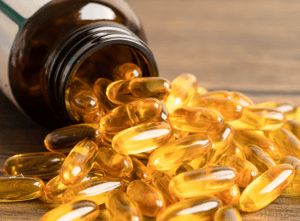 Fish Oil: As the name suggests, these supplements contain oils from fish and may help reduce triglycerides. This is because the oil from cold water fatty fish, like salmon and tuna, is rich in omega 3 fatty acids. Though there are several types of omega 3 fatty acids, the most beneficial types for triglycerides are eicosapentaenoic acid (EPA) and docosahexaenoic acid (DHA). Research suggests that those with triglycerides >500 mg/dl might benefit the most from prescription fish oil supplements.
Fish Oil: As the name suggests, these supplements contain oils from fish and may help reduce triglycerides. This is because the oil from cold water fatty fish, like salmon and tuna, is rich in omega 3 fatty acids. Though there are several types of omega 3 fatty acids, the most beneficial types for triglycerides are eicosapentaenoic acid (EPA) and docosahexaenoic acid (DHA). Research suggests that those with triglycerides >500 mg/dl might benefit the most from prescription fish oil supplements.
Red Yeast Rice: This supplement is made from yeast that grows on rice and contains a compound that is also used to make lovastatin, a cholesterol-lowering medication.
While it might be appealing to take a supplement rather than a medication, it’s important to remember that the supplement industry is not regulated. Therefore, the quality, safety, and efficacy of supplements are not guaranteed. For any supplement you might be considering, check with your doctor first. Always take supplements from a reputable brand and is USP certified.
Getting enough exercise benefits your heart in several ways:
- It helps your body return more bad cholesterol (LDL) from your blood vessels to your liver.
- Vigorous exercise may help your body produce more good cholesterol (HDL).
- Exercise can lower your blood pressure by strengthening your heart.
Remember, the goal for physical activity is at least 150 minutes/week of moderate or vigorous intensity. To learn more, check out these Be Well pages:
Sleep and stress are often overlooked when talking about heart health. When you’re chronically stressed or sleep deprived, you might be more likely to engage in unhealthy behaviors like smoking, drinking more alcohol, or skipping your workouts. Stress might also cause your body to produce more bad cholesterol (LDL) or triglycerides. It may also cause your liver to be less likely to clear those fats from your blood vessels.
Take a look at the Sleep and Stress and Resilience Be Well pages to learn more.
It is well known that tobacco use has a negative impact on your heart health. Even smoking “just a little” can increase your risk for cardiovascular disease over time. Tobacco use increases inflammation. It also decreases the flexibility of your blood vessels, thickens your blood, and increases clot formation. Last but not least, every time you smoke, your blood pressure goes up.
One of the best things you can do for your heart is quit tobacco—it’s never too late to quit.
If you’re interested or even just thinking about quitting, take a look at our Tobacco Cessation page on Be Well, and talk to your provider. There are so many ways to make quitting less stressful.
Your Crossover care team is here to help. We have coaches who can make a plan so you know where to start. Our mental health team can talk you through your stress and anxiety. Our physical therapy team can help you recover from injury with safe movement. Or you can start with a physical for a full picture of your overall health. Wherever and whenever you’re ready to begin, just connect with your Crossover care team. We want you to be well.

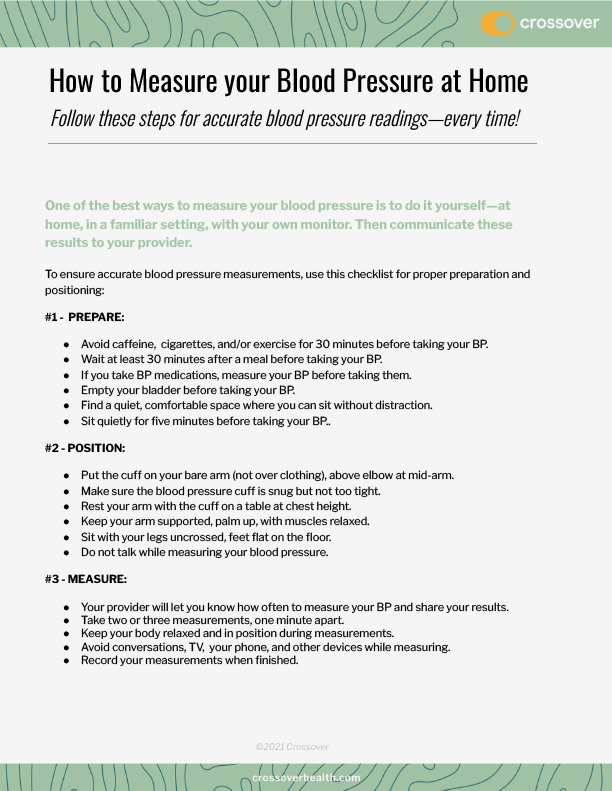 How to Measure your Blood Pressure at Home
How to Measure your Blood Pressure at Home